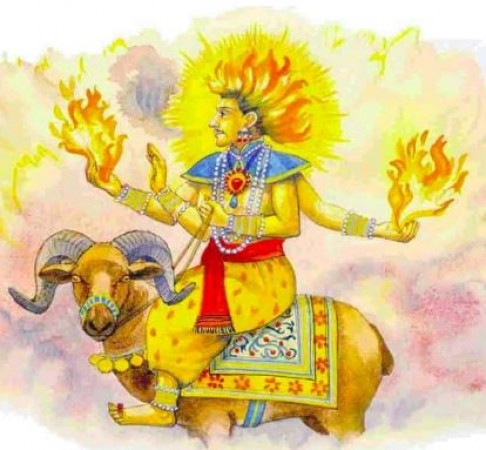
Agni Deva, the Vedic God of Fire, holds a significant place in Hindu mythology and the ancient scriptures known as the Vedas. As one of the most revered deities, Agni plays a crucial role in various aspects of Vedic rituals and religious practices.
In Hinduism, Agni Deva represents the primordial fire that possesses transformative and purifying qualities. The word "agni" itself means fire in Sanskrit, and it is believed to be the intermediary between the mortal realm and the gods. Agni serves as a channel of communication between humans and the celestial beings, carrying offerings and prayers from the Earth to the divine realms.
Also Read: Hindu Temples and Their Architectural Styles Across India
Agni is often depicted as a radiant figure with two or seven tongues, symbolizing his all-consuming nature. He is portrayed with a reddish complexion, representing the burning flames of fire. Agni is usually depicted riding a chariot pulled by fiery horses or as a celestial bird perched on a lotus. His divine presence is accompanied by a captivating glow and a warm, comforting energy.
As the God of Fire, Agni plays multiple roles within Hindu mythology. He is considered the divine messenger, carrying sacrifices and prayers to the gods. Agni is also known as the priest of the gods, presiding over rituals and acting as the intermediary between the human and divine realms. Through the ritual of Agnihotra, devotees offer oblations to Agni, invoking blessings, prosperity, and divine grace.
Agni's importance extends beyond the religious sphere. Fire is essential for human survival and sustenance, providing warmth, light, and the ability to cook food. As the God of Fire, Agni symbolizes these vital elements necessary for human civilization. Fire also represents transformation and purification, as it consumes and purges impurities, leaving behind a renewed state. Agni embodies these transformative qualities and is invoked during important life events such as marriages and yajnas (sacrificial rituals).
Also Read: Siddhivinayak Temple: A Divine Abode of Lord Ganesha
In the Vedas, Agni is revered in various hymns, praising his power and benevolence. He is often described as the immortal, omniscient, and all-pervading deity who witnesses all actions and thoughts. Agni is believed to be the divine witness to both individual and collective karmas (actions), and he ensures that the sacrifices and prayers reach their intended destinations. Through Agni, the gods receive offerings and blessings from their devotees.
One of the most famous legends associated with Agni is his encounter with Lord Shiva. According to the ancient scriptures, the sage Bhrigu once challenged the divine trinity—Brahma, Vishnu, and Shiva—to determine who among them were the most superior. Brahma and Vishnu claimed superiority, leading to a cosmic battle. In the midst of this conflict, a massive pillar of fire appeared before them. Brahma and Vishnu decided to find the ends of the pillar, but they failed. Agni then took the form of a flaming boar and sought to discover the source of the pillar. Eventually, Shiva revealed himself from within the pillar and blessed Agni for his unwavering dedication and perseverance.
Also Read: Lakshmi Narayan Temple, Delhi: A Historical and Spiritual Haven
Another important aspect of Agni's mythology is his association with sacrifice. Sacrificial rituals, known as yajnas, were performed by the ancient seers to propitiate the gods and maintain cosmic order. Agni was considered the chief priest of these rituals, facilitating the communication between humans and the divine realm. The Vedas contain detailed instructions on how to conduct these yajnas, with Agni serving as the central figure.
Agni Deva also has several epithets that reflect his diverse attributes and functions. He is known as Jataveda, meaning "one who knows all births," highlighting his omniscient nature. Agni is also referred to as Pavaka, signifying his purifying qualities, and Havyavahana, symbolizing his role as the carrier of offerings. Additionally, he is called Vibhavasu, meaning "the one who shines in all directions," emphasizing his radiant and all-pervading presence.
Also Read: Indra Dev: Prominent Vedic Deity
Agni Deva, the Vedic God of Fire, holds immense importance in Hindu mythology. As the intermediary between mortals and gods, Agni plays a crucial role in religious rituals, carrying offerings and prayers to the divine realm. He embodies the transformative and purifying qualities of fire and symbolizes the essential elements of warmth, light, and sustenance. Agni's legends and epithets reflect his diverse attributes and functions, showcasing his omnipresence and omnipotence. Through his benevolence and divine grace, Agni Deva continues to inspire and guide devotees in their spiritual journey.
Also Read: Konrak Sun Temple: Corner Sun